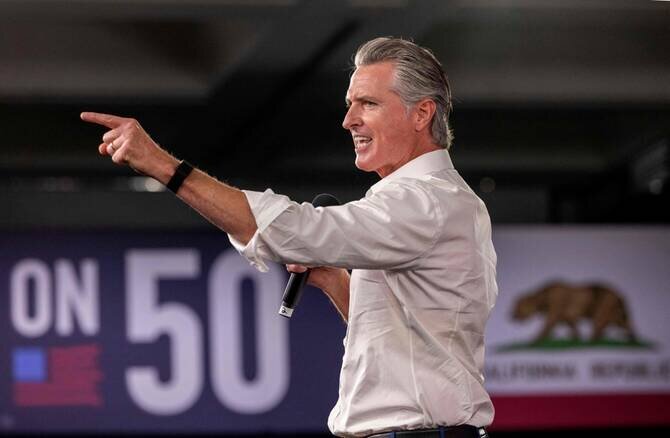
California Set to Vote on Redistricting Measure Targeting Trump
Voters in California are expected to approve a temporary redrawing of electoral districts that could shift the balance towards Democrats.
In an effort to counteract what they perceive as Republican gerrymandering, particularly following Texas's recent redistricting efforts under pressure from President Donald Trump, Californians will vote on a measure aimed at altering their state's electoral boundaries.
The proposed initiative, known as Proposition 50, seeks to adjust the districts in a way that would potentially grant the Democratic Party five additional seats in the U.S. Congress during the next year’s midterm elections.
Proponents of the measure, led by Governor Gavin Newsom, argue it is necessary to level the playing field after Texas Republicans pushed through their own redistricting plans intended to maintain and even expand their control over the House of Representatives.
This move by Texas has allowed Trump to continue with little Congressional opposition, they claim.
Opposing the measure, Republicans argue that it represents a power grab that would disenfranchise their supporters in California, where Democrats hold a significant numerical advantage.
The outcome of the vote is seen by many as a litmus test for political allegiances, with supporters viewing it as an effort to balance out electoral unfairness and opponents fearing it could marginalize the Republican Party within the state.
The practice of drawing electoral districts has long been a contentious issue in U.S. politics, often favoring the party in power by determining district boundaries to concentrate voters who are likely to support their candidates.
Historically, this process has led to situations where the composition of Congress does not accurately reflect the national population split between political parties.
In 2001, California dismantled its former system of partisan redistricting, instead establishing an independent commission to oversee the drawing of electoral maps.
If Proposition 50 passes on Tuesday, it would allow for politically drawn boundaries to be used until the next census, after which the independent panel will resume control over map-drawing.
The vote has become intertwined with broader sentiments against Trump's administration and is being framed by many as an opportunity to assert defiance against him.
Advertisements promoting a 'yes' vote on Proposition 50 feature imagery of Trump in a negative light, invoking a desire to resist what is perceived as his authoritarian tendencies.
Despite opposition, polls indicate that the measure will likely pass with a significant margin.
For Governor Newsom, who is considered a potential presidential candidate in 2027, securing passage of Proposition 50 could bolster his image as a strong opponent of Trump and enhance his political capital.
The proposed initiative, known as Proposition 50, seeks to adjust the districts in a way that would potentially grant the Democratic Party five additional seats in the U.S. Congress during the next year’s midterm elections.
Proponents of the measure, led by Governor Gavin Newsom, argue it is necessary to level the playing field after Texas Republicans pushed through their own redistricting plans intended to maintain and even expand their control over the House of Representatives.
This move by Texas has allowed Trump to continue with little Congressional opposition, they claim.
Opposing the measure, Republicans argue that it represents a power grab that would disenfranchise their supporters in California, where Democrats hold a significant numerical advantage.
The outcome of the vote is seen by many as a litmus test for political allegiances, with supporters viewing it as an effort to balance out electoral unfairness and opponents fearing it could marginalize the Republican Party within the state.
The practice of drawing electoral districts has long been a contentious issue in U.S. politics, often favoring the party in power by determining district boundaries to concentrate voters who are likely to support their candidates.
Historically, this process has led to situations where the composition of Congress does not accurately reflect the national population split between political parties.
In 2001, California dismantled its former system of partisan redistricting, instead establishing an independent commission to oversee the drawing of electoral maps.
If Proposition 50 passes on Tuesday, it would allow for politically drawn boundaries to be used until the next census, after which the independent panel will resume control over map-drawing.
The vote has become intertwined with broader sentiments against Trump's administration and is being framed by many as an opportunity to assert defiance against him.
Advertisements promoting a 'yes' vote on Proposition 50 feature imagery of Trump in a negative light, invoking a desire to resist what is perceived as his authoritarian tendencies.
Despite opposition, polls indicate that the measure will likely pass with a significant margin.
For Governor Newsom, who is considered a potential presidential candidate in 2027, securing passage of Proposition 50 could bolster his image as a strong opponent of Trump and enhance his political capital.










